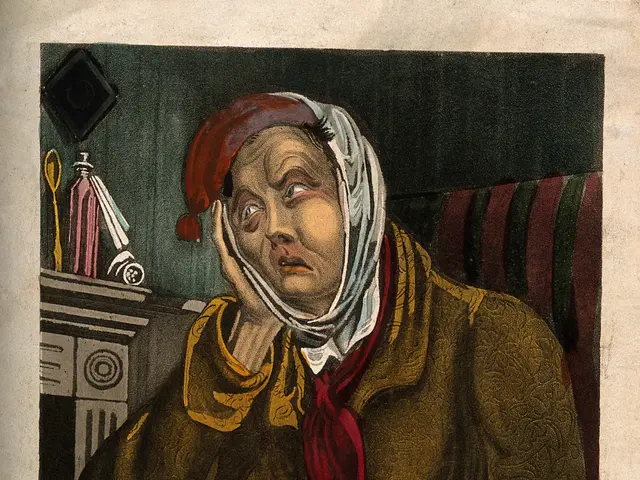"Tatort" with Faber and Herzog: A Persistent Problem Unaddressed
Inherent architectural complication found in the subject matter.
Social Media Sharing: Facebook | Twitter | WhatsApp | Email | Print | Copy Link
The recent Dortmund "Tatort" episode tackled the heart-rending issue of domestic violence. While Germany's parliament passed the "Gewalthilfegesetz," the issue remains unresolved as the new law won't be enforced until 2032, marking a significant delay.
In 1976, Germany's first women's shelter opened in Berlin, offering victims a refuge from the violence at home. The shelter was a testament to the autonomous women's movement, getting its initial funding from the Ministry of the Family. Today, a memorial plaque in Richard-Strauss-Straße 22 in the Grunewald district pays tribute to the shelter's history, summing up the issue succinctly: "Violence is not a private, but a structural problem." The shelter operated with feminist sensibilities, focusing on solidarity and mutual aid. Unfortunately, it closed its doors in 2000 due to generational conflicts and conflicting views.
Modern women's shelters have moved from the margins to the center of society, underscoring the high demand and pertinence of this issue. The latest "Tatort" made domestic violence the main focus, using the tragic case of Meike Gebken, a woman killed by her abusive husband after seeking refuge in a shelter, as a dramatic example.
Statistics from the Federal Criminal Police Office's situation report reveal that every day, a woman loses her life to domestic violence in Germany. Lisa Paus, former Green Party's Federal Minister for Family, Senior Citizens, Women, and Youth, shared this harrowing statistic: "One in three women will be a victim of physical or sexual violence at least once in her life. One in three women - that means we all know someone."
Media:- TV – Tatort: Caught between beer and pedagogy- Femicide – Alarming numbers- Crime – The stark reality of domestic violence- Women – The constant battle against violence- Violence – An ongoing struggle
The numbers are staggering – in 2023, there were over 52,000 victims of sexual crimes, marking a 6.2% increase compared to the previous year. The figures for domestic violence are even more distressing: over 256,000 affected individuals, with more than 70% being women and girls. In 2023, some 360 women were killed by their partners or ex-partners, equating to almost one femicide per day.
With around 400 women's shelters and over 40 safe houses or shelters with over 6,000 places across Germany, as well as about 750 specialized counseling centers for women affected by violence, funding remains a major challenge. In North Rhine-Westphalia, women with regular incomes pay between 25 and 100 euros per day for shelter, depending on their residence.
Press:- TV – Erdinger Weißbier ad sparks outrage: "Glorification of Femicides"- Government Response – A delay of seven years for the "Violence Assistance Act"
Relief is on the horizon, with the "Violence Assistance Act" promising financial assistance and insurance coverage for counseling and shelter costs. A total of 2.5 billion euros has been pledged to fund the law by the federal government. The law was passed at the end of January and received approval from the Bundesrat on February 14, marking it as "a reliable support system in gender-specific and domestic violence cases."
However, the delayed implementation of the law raises questions. Seven years – that's about 2,500 femicides, according to current numbers. The government claimed that it needs these seven years to expand support systems accordingly. The original motto for the first women's shelter reads, "We have nothing to lose but our fear." Given the current numbers, it's clear: We have no time to lose.
- Women's rights have long been a focus in policy-and-legislation, particularly in addressing the persistent issue of domestic violence, showcased in the recent "Tatort" episode.
- Despite Germany's parliament passing the "Gewalthilfegesetz," there is a significant delay in its enforcement, which will occur in 2032.
- Science, specifically in the field of health-and-wellness, has been instrumental in exposing the extent of sexual-health and mental-health issues related to domestic violence, with alarming numbers revealing over 52,000 victims of sexual crimes and 256,000 affected individuals due to domestic violence in 2023.
- The right to have a say is crucial in politics, as echoed by Lisa Paus, former Green Party's Federal Minister for Family, Senior Citizens, Women, and Youth, who revealed the harrowing statistic that one in three women in Germany will be a victim of physical or sexual violence at least once in her life.
- mens-health and womens-health initiatives must receive adequate funding to combat issues like domestic violence effectively, as modern women's shelters face financial challenges despite their high demand, with women with regular incomes paying between 25 and 100 euros per day for shelter in North Rhine-Westphalia.








